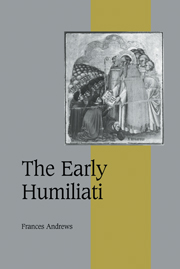Book contents
- Frontmatter
- Contents
- Acknowledgements
- List of abbreviations
- Map
- Introduction
- 1 Tradition and history
- 2 The beginnings of the Humiliati: the twelfth-century evidence
- 3 Quia in nullo peccabant: the inspection and approval of the Humiliati 1199–1201
- 4 Rules
- 5 In search of communities
- 6 New members and profession of vows
- 7 Unity and uniformity: the development of a centralised order
- 8 The Humiliati and the Church in the localities
- Conclusion
- Appendices
- Bibliography
- Index
- Cambridge Studies in Medieval Life and Thought: Fourth Series
Introduction
Published online by Cambridge University Press: 02 November 2009
- Frontmatter
- Contents
- Acknowledgements
- List of abbreviations
- Map
- Introduction
- 1 Tradition and history
- 2 The beginnings of the Humiliati: the twelfth-century evidence
- 3 Quia in nullo peccabant: the inspection and approval of the Humiliati 1199–1201
- 4 Rules
- 5 In search of communities
- 6 New members and profession of vows
- 7 Unity and uniformity: the development of a centralised order
- 8 The Humiliati and the Church in the localities
- Conclusion
- Appendices
- Bibliography
- Index
- Cambridge Studies in Medieval Life and Thought: Fourth Series
Summary
Heresy lies in the eye of the beholder.
The early Humiliati stood at a crossroads between tradition and novelty, orthodoxy and heresy. Latin Europe in the last decades of the twelfth century saw an outpouring of new forms of religious life which Marie-Dominique Chenu has described as an ‘Evangelical Awakening’: a renewed search for a more intense religious experience focused on the life of Christ and the apostles, as described in the Gospel: the vita apostolica and the model of the early Church, the ecclesiae primitivae forma. The most successful of these new movements in the twelfth century, both numerically and historiographically, were the Cathars and Waldensians. The dualist faith of the Cathars took fast hold in the Languedoc and northern Italy and the Cathar Church was acquiring a clear organisational structure separate from that of the Church of Rome. The Waldensians came together in the 1170s as followers of Valdes of Lyons, a charismatic figure who attracted attention by his dramatic conversion to a life of poverty and preaching. When the English churchman and raconteur Walter Map encountered him and his followers at the papal Curia in 1179 he ridiculed their ignorance, but was sufficiently alarmed to observe ‘they are making their first moves in the humblest manner because they cannot launch an attack. If we admit them, we shall be driven out.’ Both Cathars and Waldensians were considered heretics by men of the Church and were caught in the broad net of the anathema declared in November 1184 by pope Lucius III sitting in council with Frederick I Barbarossa at Verona. Within a generation, the Waldensians had acquired a substantial body of members and, like the Cathars, were becoming doctrinally more remote from the orthodox Church.
- Type
- Chapter
- Information
- The Early Humiliati , pp. 1 - 5Publisher: Cambridge University PressPrint publication year: 2000
- 1
- Cited by



